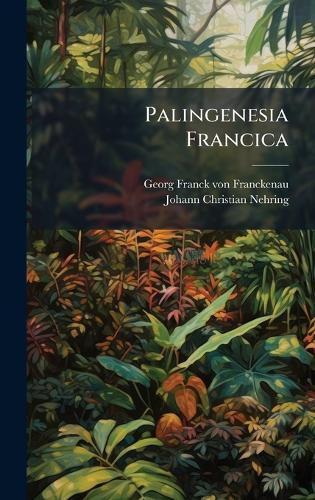Readings Newsletter
Become a Readings Member to make your shopping experience even easier.
Sign in or sign up for free!
You’re not far away from qualifying for FREE standard shipping within Australia
You’ve qualified for FREE standard shipping within Australia
The cart is loading…






"Palingenesia Francica," subtitled "Oder: ... Tractaetlein Von Der KA1/4nstlichen Auferweckung Derer Pflanzen, Menschen Und Thiere Aus Ihrer Asche," explores the concept of palingenesis-the artificial resurrection of plants, animals, and humans from their ashes. Authored by Georg Franck von Franckenau and Johann Christian Nehring, this historical treatise delves into the alchemical and natural philosophical ideas prevalent in the 17th century.
This work offers valuable insights into the intersection of science, philosophy, and esoteric beliefs during a period of significant intellectual transformation. Franck von Franckenau and Nehring's exploration of palingenesis reflects the era's fascination with the mysteries of life, death, and the potential for manipulating natural processes. "Palingenesia Francica" remains a fascinating document for those interested in the history of science, alchemy, and the development of early modern thought.
This work has been selected by scholars as being culturally important, and is part of the knowledge base of civilization as we know it. This work was reproduced from the original artifact, and remains as true to the original work as possible. Therefore, you will see the original copyright references, library stamps (as most of these works have been housed in our most important libraries around the world), and other notations in the work.
This work is in the public domain in the United States of America, and possibly other nations. Within the United States, you may freely copy and distribute this work, as no entity (individual or corporate) has a copyright on the body of the work.
As a reproduction of a historical artifact, this work may contain missing or blurred pages, poor pictures, errant marks, etc. Scholars believe, and we concur, that this work is important enough to be preserved, reproduced, and made generally available to the public. We appreciate your support of the preservation process, and thank you for being an important part of keeping this knowledge alive and relevant.
$9.00 standard shipping within Australia
FREE standard shipping within Australia for orders over $100.00
Express & International shipping calculated at checkout
Stock availability can be subject to change without notice. We recommend calling the shop or contacting our online team to check availability of low stock items. Please see our Shopping Online page for more details.
"Palingenesia Francica," subtitled "Oder: ... Tractaetlein Von Der KA1/4nstlichen Auferweckung Derer Pflanzen, Menschen Und Thiere Aus Ihrer Asche," explores the concept of palingenesis-the artificial resurrection of plants, animals, and humans from their ashes. Authored by Georg Franck von Franckenau and Johann Christian Nehring, this historical treatise delves into the alchemical and natural philosophical ideas prevalent in the 17th century.
This work offers valuable insights into the intersection of science, philosophy, and esoteric beliefs during a period of significant intellectual transformation. Franck von Franckenau and Nehring's exploration of palingenesis reflects the era's fascination with the mysteries of life, death, and the potential for manipulating natural processes. "Palingenesia Francica" remains a fascinating document for those interested in the history of science, alchemy, and the development of early modern thought.
This work has been selected by scholars as being culturally important, and is part of the knowledge base of civilization as we know it. This work was reproduced from the original artifact, and remains as true to the original work as possible. Therefore, you will see the original copyright references, library stamps (as most of these works have been housed in our most important libraries around the world), and other notations in the work.
This work is in the public domain in the United States of America, and possibly other nations. Within the United States, you may freely copy and distribute this work, as no entity (individual or corporate) has a copyright on the body of the work.
As a reproduction of a historical artifact, this work may contain missing or blurred pages, poor pictures, errant marks, etc. Scholars believe, and we concur, that this work is important enough to be preserved, reproduced, and made generally available to the public. We appreciate your support of the preservation process, and thank you for being an important part of keeping this knowledge alive and relevant.